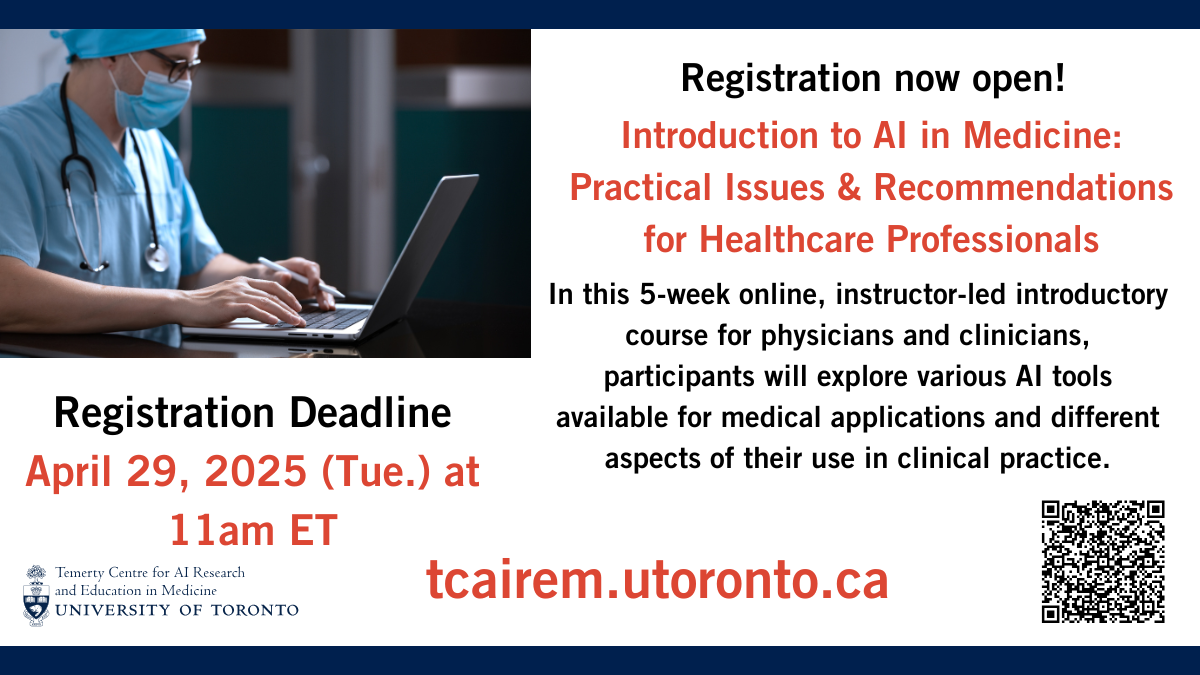Mobile Menu
- About Us
- Partnerships
- Events
- News
- Research
- Education
- Infrastructure
- Community

In this five-week, online instructor-led course, participants will learn about various AI tools available for medical applications, including Large Language Models. They will also explore different aspects of using AI tools in clinical practice, such as medicolegal and data privacy risks, as well as ethical considerations. (This course is CPD accredited.)
This course is designed for health professionals such as physicians and clinicians and assumes no prior knowledge of AI or coding. It is not intended to be a technical course focused on coding. Instead, it is a practical course on understanding and applying readily available AI technologies to everyday practice.
TIMELINE: Two hours per week for five weeks on a Saturday morning starting May 3, 10, 17, 24 and June 7, 2025. Each Saturday morning session runs from 10:00am to 12:00pm EDT. NOTE: There is no session on Saturday, May 31, 2025.
COST: $950
ACCREDITATION: This course is CPD accredited: College of Family Physicians of Canada Mainpro+® Certified Activity and the Royal College Maintenance of Certification Section 1 for 10.0 hours
REGISTRATION DEADLINE: April 29, 2025 (TUE.) at 11am ET
Dr. Nihal Haque is a physician specializing in geriatric medicine at North York General Hospital in Toronto, Canada, and an Adjunct Assistant Professor at the University of Toronto. He has obtained certification in Artificial Intelligence (AI) in Healthcare from the Michener Institute and Harvard T.H. Chan School of Public Health. He is a physician representative of his hospital's AI working group and is part of an interdisciplinary team that recently obtained federal funding through Canada Health Infoway to develop AI solutions to reduce healthcare worker burnout. With a focus on improving patient outcomes through innovations in healthcare, Dr. Haque leads AI-driven research in other areas as well, such as improving dementia care and enhancing medical education in Geriatric Medicine. He is also actively involved with the TCAIREM education committee as a faculty advisor on AI in medical education.
Session 1 (May 3) from 10:00am to 12:00pm EDT
• Introduction to AI (what is it, what are algorithms, how is AI different from a non-AI computer program, what is machine learning, etc.).
• Introduction to generative AI and Large Language Models (LLM): Why are they in the news, and how can they be used practically for day-to-day medical applications?
Session 2 (May 10) from 10:00am to 12:00pm EDT
• Types of AI algorithms to know for medical practice/ terminology needed to understand medical AI.
• Discussion about convolutional neural networks, predictive algorithms, classification algorithms, supervised versus unsupervised learning, model training metrics, etc.
Session 3 (May 17) from 10:00am to 12:00pm EDT
• Medicolegal session: Medicolegal risks when using AI in practice, including discussion of current CMPA guidelines.
• CPSO/data privacy session: Privacy and professional considerations when using AI in practice, including College of Physicians of Ontario guidelines.
Session 4 (May 24) from 10:00am to 12:00pm EDT
• How do I evaluate an AI product for use in my practice? Approach to implementing AI in your hospital or clinic practice (will cover data privacy considerations, how to make a proper consent form for AI applications, which departments to involve in getting AI products approved for use, etc.).
• How can I incorporate AI into my day-to-day practice today - review of examples of applications ready to use now (AI scribes, AI chatbots, AI apps for CME, AI apps for finding medication information).
Session 5 (June 7) from 10:00am to 12:00pm EDT
• What resources can I use to stay up to date on medical AI?
• Interactive session/coursework: Divide into teams of 2/3/4/5 and evaluate AI scribes or an application of your choice for use in your clinic/hospital.
By the end of the course, the learner will be able to understand and evaluate an AI technology for incorporation into their day-to-day practice through the following learning objectives:
• To describe the fundamental concepts of artificial intelligence, including the distinction between AI and traditional computer programs, and explain the practical applications of generative AI and Large Language Models (LLMs) in clinical practice.
• To identify key AI algorithms relevant to medical practice and how they are used to solve day-to-day clinical problems
• To analyze the medicolegal and ethical issues associated with AI use in clinical practice, incorporating current CMPA, CPSO, and data privacy guidelines
• To develop a structured approach to assessing AI tools for clinical use in your clinic or hospital setting, including considerations for data privacy, patient consent, and workflow integration, while identifying readily available AI applications that can enhance day-to-day medical practice.
